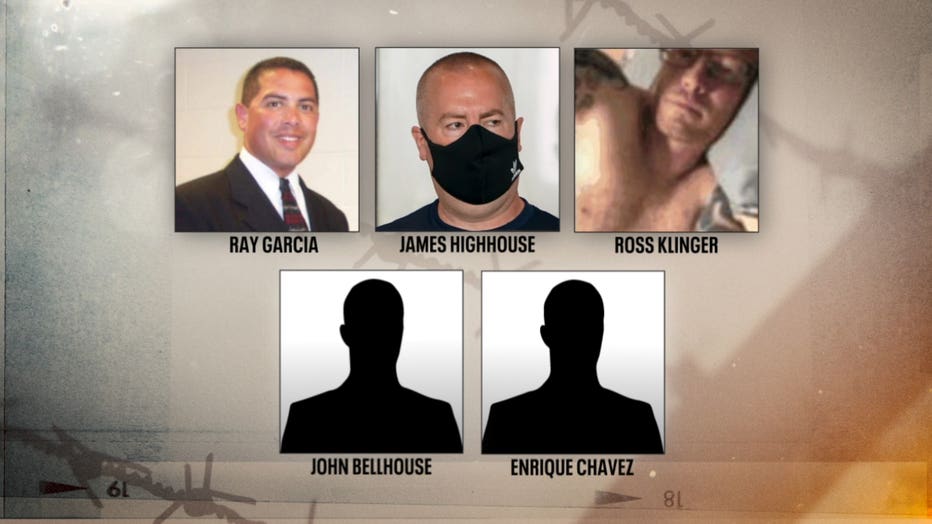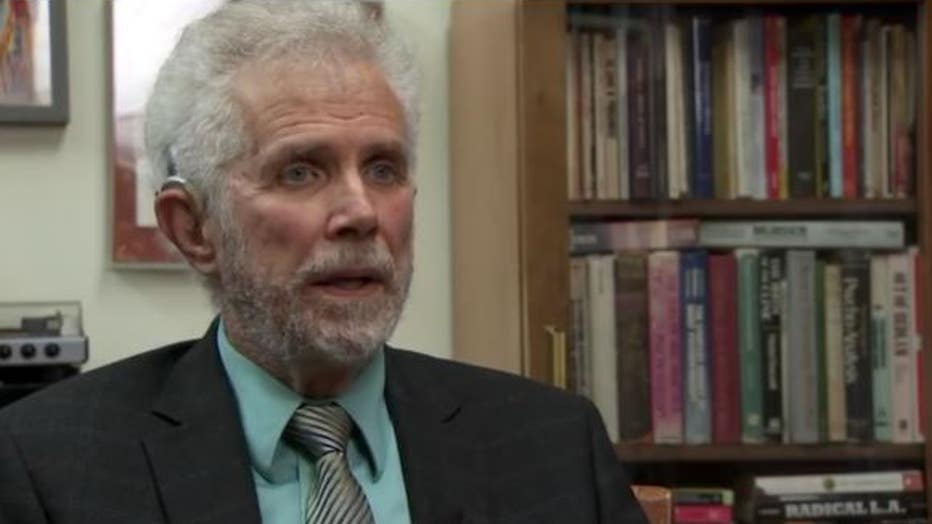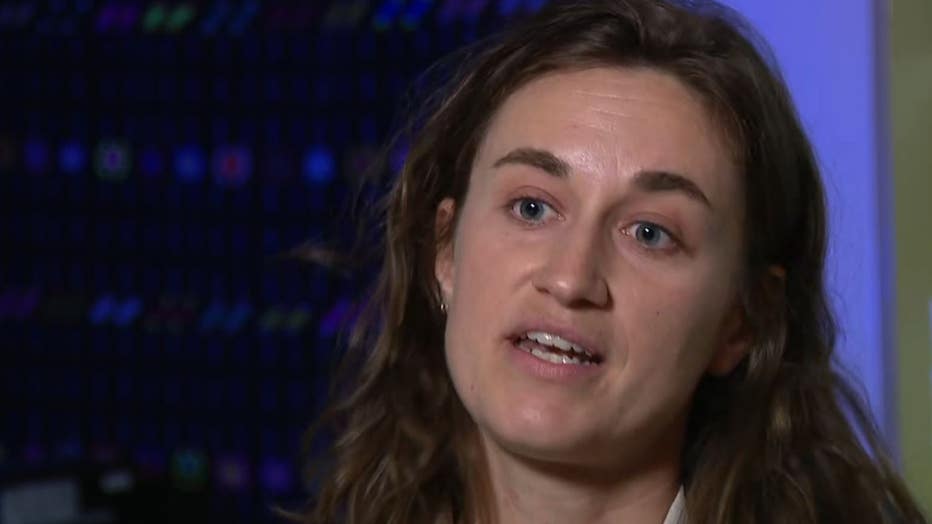Dozens of women detail rape and retaliation at Dublin prison, real reform is questioned

Dozens of women detail rape and retaliation at Dublin prison
Over the course of eight months, KTVU has spoken with more than three dozen women who say they have been sexually assaulted or witnessed such abuse at FCI Dublin. Many who spoke up were retaliated against.
DUBLIN, Calif. - When Marie Washington of San Diego was put into coronavirus quarantine at the Federal Correctional Institute at Dublin for six weeks, one guard in particular came by, shining a light in her cell, often asking to see her private parts.
He asked her to "do stuff" with her cellmate so that he could watch. He told her that he could enter her room at any time to have his way to "f---" the "s---" out of her.
"He would ask me…I’m sorry for my language…if my ass was real," Washington told KTVU, recalling events that occured in September 2020. "He would ask me to dance for him. He would then flirt with my bunkie as well. We were like asking him, ‘What do you want to see? And he was like, ‘F— her. Do it now.’ And so we engaged in sexual activity and immediately we stopped because we were like uncomfortable."
Sexual abuse in prison is all too common an affair – officers have been charged with sex crimes anywhere women are held in custody across the country.
But there’s no other prison in the United States where so many officers – five, including the former warden – have been charged with having sex with incarcerated women than FCI Dublin, a low-security women's prison about 40 miles east of San Francisco.
Over the last eight months, KTVU interviewed, emailed and read the testimony of more than three dozen women who are currently incarcerated at or released from FCI Dublin, where actresses Felicity Huffman and Lori Loughlin were housed for their roles in the college admissions scandal.
In interviews, the women described being raped, sexually assaulted, verbally threatened and retaliated against if they complained about what was going on.
WATCH: Powerless in Prison: Surviving Sex Assault
Linda Chaney of Sacramento said an officer repeatedly assaulted her in the kitchen and would "rub his dick" up against her butt. Her harassment took place from 2019 to 2021r, mostly in the kitchen area. Still, she kept quiet.
"I was afraid to speak up, because for one, I didn't want to be put in special housing," Chaney told KTVU after she had been released. "I mean, like I didn't want my room tore up, like, is just strange. Like, it just seemed like if you don't go with the flow, they're like they outcast you and treat you worser."

Aerial shot of the all-women's prison in Dublin, Calif.
Shining a light on FCI Dublin
There is no such thing as consensual sex in prison. It is illegal for someone who is in a supervisory or disciplinary position to have any type of sexual contact or relationship with a person in detention.
"What's unique about Dublin is not the egregiousness or the sheer scale of abuse," said Susan Beaty, supervising attorney for Centro Legal de la Raza in Oakland, whose nonprofit provides services for incarcerated women at FCI Dublin. "What's unique is that people are paying attention and sort of providing this opportunity to actually do something about it."
As this increased focus is now being paid to this prison that holds about 700 women, some are hoping for change.
And yet there is still ample skepticism that any real reform is really in the works.
While the possibilities for reform could exist - by changing the culture, installing cameras, implementing stricter hiring protocols and launching independent investigations – observers say they don't see much change really occurring.
In fact, in some instances, all the attention has made certain aspects of prison retribution even worse. One woman emailed KTVU from inside FCI Dublin to say that all the stories about the abuse is causing more harm for her and the other women inside the prison in terms of punishments and Draconian rules.
"I have seen since since since there's been greater media attention paid to Dublin, a crackdown on communication, it's been harder to get calls and visits," Beaty said. "We've had legal mail intercepted again and again. That's always been an issue at Dublin. But it's gotten worse. And I think part of that is an attempt to prevent the public from speaking with survivors and prevent survivors from telling their stories."

Five correctional officers at FCI Dublin have been charged with the sexual abuse of a ward.
The five officers
Two officers – Ross Klinger and James Highhouse – have pleaded guilty to the crime of sexual abuse of a ward. Former cook Enrique Garcia is scheduled to plead guilty on Oct. 27.
Former Warden Ray J. Garcia – who is charged with molesting a woman and ordering another to strip while he took pictures of her – and Officer John Bellhouse have entered not guilty pleas and are headed to trial. Charges stem from encounters documented in 2018 to 2021.
Highhouse is the only one to receive punishment so far; a judge sentenced him to seven years in prison. He lured women into his office and chapel, using faith and fear to coerce them.
Their lawyers have repeatedly declined requests for comment.
And the Bureau of Prisons has repeatedly declined requests for interviews and tours, although the agency has issued statements saying that the allegations, if true, are "reprehensible" and abhorrent."

Exclusive: Woman at center of Dublin prison sex scandal says guard used mental health files to prey on her
Andrea Reyes, 34, of Perris, Riverside County, explained in an exclusive interview that former correctional officer Ross Klinger obtained access to her private health files while she was incarcerated at Federal Correctional Institute Dublin – an all-women’s prison 40 miles east of San Francisco.
Women detail sexual abuse
The women all relayed stories with similar themes: Officers cozy up to them, promise them love and special treatment until the relationship goes sour, and then they are threatened and retaliated against if they report the abuse.
For example:
- Andrea Reyes of Perris, Calif. was promised by Correctional Officer Ross Klinger that he’d marry her, and then when she found out he was having a relationship with another woman, she broke up with him – only to be threatened by him that she had to keep on having sex. Reyes also said Klinger dipped into her mental health files to use her past triggers to prey on her. She entered the relationship because she believed his promises of love. "I believed him," Reyes said. "I guess I was alone and I was vulnerable."
- M.R. said Klinger treated her the same way, bringing her Starbucks and then using her personal information to convince her into having sex. She got so depressed about this relationship that she began cutting herself, and was denied any mental health services, she said. Klinger threatened to kill her if she snitched that they were having sex.
- L.I., an immigrant from Thailand, said that Highhouse, the prison chaplain, would dry hump her and justified his sexual requests by telling her that "everyone in the Bible has sex."
- Yvonne Palmore of Hayward, Calif., said that she was once beaten up by officers for no apparent reason. When she awoke in grave pain, she said the warden was standing over her, taking pictures. To this day, she's not exactly sure what happened to her and she said she suffers deep psychological stress.
- From prison, Aimee Chavira emailed KTVU to say an officer whose nickname is "Dirty Dick" would lock her in her cell during COVID until she showed him her breasts through the door. The officer would keep coming to her cell to see if she was going to the bathroom. She would tell him to get away. And he would laugh at her and tell her he wouldn't leave until she stood up from the toilet. "He began to get aggressive and this began to scare me bad," she wrote.
- Valerie Mercadel of Long Beach, Calif., stopped an attempted rape on her at FCI Dublin nearly 30 years ago. "I was petrified," she said. She said she was treated like "a whore" by the male staff. "That's how they treated us," she said. "Like we were prostitutes." Mercadel became a pastor upon her release. To this day, she said her mental health is poor, and she can't shake the trauma of what happened to her.
- Cherie Dillon of Idaho reported to authorities that her cellmate had an illegal sexual relationship with an officer – and then she was punished for speaking up about it. Dillon said her "good time" was taken away, she lost her commissary and she had to talk on the phone to her husband while handcuffed. "I will never tell another inmate that they should go to report anything to anyone higher up," Dillon told KTVU. "Because all that's going to happen is it's going to make their life worse.

Dublin prison guard says she was forced out for reporting abuse
Tess Korth worked as a federal correctional officer at Dublin's prison for 25 years, in which she reported the abuse of women. Then, she got a letter telling her she was re-assigned to a male facility in Oregon. She left. And now, she's telling her side of the story.
And it's not just incarcerated women who witnessed or experienced the abuse.
Tess Korth, a former prison unit manager, told KTVU that she reported sexual and verbal abuses many times over her 25 years as an employee.
She said the treatment of the women was awful.
"The way they refer to them, like they were bitches," Korth said. "And those were the nicer terms they used."
Mostly, Korth said her complaints fell on deaf ears.
That is until May, when she believes her whisteblowing essentially forced her out of her job with a reassignment to another state. Instead of taking the new post, Korth retired, telling management to "shove it."
The abuse occurs because it can
Dr. Terry Kupers of Berkeley, a forensic psychiatrist who testifies in prison and sexual abuse cases, said illegal and bad behavior occurs – because it can.
In this case, the abuse came from the top, with the warden himself.
"Sexual abuse in prison doesn't happen in a culture that doesn't allow it," Kupers said. "The women that are locked up in the prison have absolutely no power. The officers are in total control. And if they're sexually abused, they have no one to complain to and nobody is going to do anything. That is the perfect storm for officers abusing women."
Throwing women in solitary confinement adds another layer onto the abuse.
"Women are terrified of solitary confinement more than men are," Kupers said. "In solitary, you have no connection with other human beings. And that’s very important to women. So they dread being sent to solitary and therefore they don’t report. You can’t have women reporting to the very officers who are abusing them."
Could reforms be ahead?
Associated Press reporters Michael Balsamo and Mike Sisak first started uncovering a "hotbed of corruption" throughout the 122-federal prison system after financier Jeffrey Epstein died by suicide and they wondered how and why officers weren't watching the nation's most high-profile inmate.
They found systemic issues throughout the entire Bureau of Prison system.
Balsamo noted that prisons are shrouded in secrecy and for the first time now, even if it's only a sliver of light, the agency is now facing increased scrutiny oversight from the public and members of Congress.
"There's been a shake up in leadership at the prison and all the way up the Bureau of Prisons," Balsamo said. "I think for the first time we're starting to see, you know, the Justice Department kind of making this a top priority, especially what's happening at Dublin."
For example, this summer, U.S. Senate Permanent Subcommittee on Investigations Chair Jon Ossoff and Ranking Member Ron Johnson began holding hearings on the prison systems to try to uncover abuse and force reform.
Ossoff has been extremely critical of FCI Dublin's management, taking the former director to task during a July hearing, asking how he could promise to keep women safe in a prison that's been nicknamed "the rape club."
A new Bureau of Prisons director, Colette Peters, took office on Aug. 2.
Many hope she is a reformer. However, she declined to meet with KTVU when she visited Dublin in September, as has the new warden of the facility.
However, on Thursday, her office issued a lengthy statement, saying that she vowed to "change the culture" at FCI Dublin.
Meanwhile, the Department of Justice has vowed to prosecute any officer who is found having sex with incarcerated women and sources have told KTVU that "more charges are coming."
In August, a federal grand jury did just that; issuing an eight-count superseding indictment charging former Garcia with seven counts of sexually abusive conduct against three women who were in custody at the Federal Correctional Institute in Dublin.
"The Department of Justice takes seriously its obligation to provide safe and humane treatment to individuals in our custody," a spokesman for the DOJ told KTVU. "Make no mistake that the Department will not tolerate this behavior by its employees, at any level, and will investigate and prosecute these cases aggressively when necessary."
At least two dozen more officers are under investigation as part of this widening probe, KTVU has learned.
Beaty, from Centro Legal, said she is cautiously optimistic.
"I think if there's any cause for hope, it's that there's finally been light shed on the widespread issue of sexual abuse in prisons, particularly women's prisons, and that people who were abused, women who were abused at Dublin are feeling empowered to speak out and to tell their stories," Beaty said.

Formerly incarcerated woman at Dublin prison says she was retaliated against for outing sexual abuse
Cherie Dillon is speaking out about her experience at the federal prison in Dublin, revealing that when she reported the sexual abuse of a peer, both women were retaliated against with extra time and solitary confinement.
Not enough security cameras
But there are also steps not being taken, which concern those like Beaty, question whether the reform is real or just lip service.
For example, Congress allotted money for FCI Dublin to install security cameras at its facility, which would serve as a deterrent for unwanted sex and could capture these acts on film.
But as of March, there were at least 28 spots in the kitchen, residences and commissary that still didn't have cameras, according to U.S. Rep. Jackie Speier's office.
Kupers said installing cameras is key.
"They're going to abuse an area of the prison that's not on surveillance camera," he said. "And that's where the abuse happens."

Dublin prison officer made California woman engage in sex acts with cellmate, claim alleges
More women are coming forward with allegations of sexual harassment against correctional officers at the federal prison in Dublin.
Need for independent investigators
Aside from wanting camera surveillance to document abuse, FCI Dublin critics also want a third-party, neutral agency to accept reports of abuse, and then investigate them independently.
Currently, these complaints often fall on deaf ears or are looked into by Bureau of Prisons employees themselves.
And if they are looked into, it's often the whistleblower who suffers.
"We have to stop the way that we have to stop the way the bureau does stuff," Korth said. "You know, we have investigators that are the BOP. You know, how am I supposed to investigate somebody that I've known for 20 years?"
Male guards in a female prison
And then there’s the issue of having male guards watch over female inmates.
Kupers has long advocated that men should not be guarding women – especially those who are essentially living in cages.
"This has been a problem for a long time," Kupers said. "I don’t think male officers should be in women’s prisons except on the perimeter."
In Michigan, for example, Kupers said that lawsuits have forced the corrections department to reach a compromise: Allowing male officers to be present in the facility, but not in the housing units or bathrooms where women dress and shower.
"And that’s pretty much the standard around the country now," he said.
There has been no public movement in the federal system or in California to tackle this issue.

Dr. Terry Kupers is a forensic psychiatrist with an expertise in prison conditions.
Better hiring procedures
Korth also noted that many of the male guards who are hired, are also ex-military and who may have suffered the ill effects of war and who were never treated for their own mental issues.
For example, Highhouse, the former prison chaplain who was sentenced to prison for forcing women to have sex with him, blamed the PTSD he suffered in the Army as the reason for his "impulse control."
He argued unsuccessfully for leniency at his sentencing hearing, saying that he was deployed to Afghanistan and Iraq, suffered from depression and PTSD and was labeled clinically "disabled" as a result by Veteran's Affairs.
Not only that, Korth said that she has seen over the last 25 years that many officers get hired simply because of who they know.
"The hiring practices are a joke," she said. "I mean the bureau people are hiring the bureau people."
And then, Korth said, there seems to be no strict screening for new employees.
"I mean, every other law enforcement agency makes you take a psych test or something, one of those personality tests," Korth said.
But at FCI Dublin, Korth said there's "nothing. I mean nothing."

Supervising attorney Susan Beaty at Centro Legal de La Raza in Oakland has been helping incarcerated women at FCI Dublin.
Request for release, holding leaders accountable
Beaty also has several demands for the Bureau of Prisons.
Chief among them is releasing women who have survived sexual abuse inside the prison.
"The BOP, the DOJ need to release these survivors to their families, to their communities so that they can receive supportive services and begin to heal," Beaty said. "I think it's made worse by the fact that they're forced to remain in the very cages, in the very spaces where this abuse happened."
In addition, the sexual assault survivors want those in leadership to be held accountable.
"Arresting a handful of bad actors is not enough," Beaty said. "This is a systemic problem. What a lot of survivors are calling for is not just the people who abused them to be removed from their positions of power, but also the leaders who absolutely knew this abuse was happening and condoned it and allowed it to happen."
Lisa Fernandez is a reporter for KTVU. Email Lisa at lisa.fernandez@fox.com or call her at 510-874-0139. Or follow her on Twitter @ljfernandez

